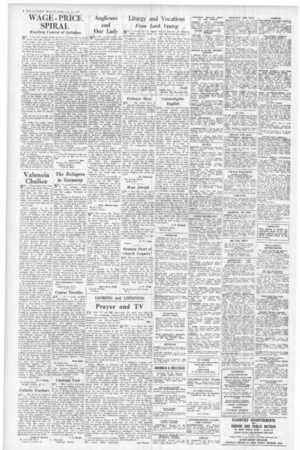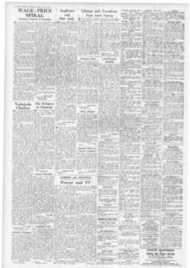Page 2, 26th July 1957
Page 2

Report an error
Noticed an error on this page?If you've noticed an error in this article please click here to report it.
Tags
Share
Related articles
Inflation And The Crisis
Some Grow Rich : Others Remain Poor
Religion And Inflation
The Whole Of Any One Venture. His Plan Of Campaign
Can Another Slump Be Prevented ?
WAGE PRICE SPIRAL
Monetary Control of Inflation
SIR.-I can only repeat: rising prices are not caused by rising wages; they are caused psi:barfly by large scale creation of money. The volume of money is controlled by the Treasury and the Bank of England.
In the long run, it works out like this. According to Mr. Butler, the volume of goods for sale in 1980 will be twice as great as in 1955. If then, prices are to be kept
-steady, the Bank of England must see to it that the volume of money is doubled.
For prices to rise 100 per cent. the volume of money would have to he quadrupled. The first would involve a considerable creation of money: the second would mean a very large scale creation of money.
This creation of moncy takes two forms. It can be on Government account or on private account.
If the Government's total expenditure in the Budget year is not covered by taxation or long term borrowing in short, if the Government fails to pay its waythe banks will be constrained to create money and hand it over to the Treasury to enable the Government to meet its commitments.
Since the war about £1,200 million has been created for this purpose.
The banks also create money uhenever they make advances to industry. There has been another £1,200 million created in this way since the war.
This additional £2,400 million includes £800 million of newly printed notes issued by the Bank of England, and S1,600 million of additional Bank Deposits. ,
The Ranks work to an eight per cent. ratio, in that the additional deposits have had to be covered by £128 million of cash-partly notes to the till, partly balances at the Bank of England.
By selling securities, the Bank of England reduces Bank cash; by buying securities it increases Bank cash. In this way, the Bank of England has full power to control the volume of money; it has full power, in the long run, to control
the movement of prices. It is this creation of money by the 'I reasury and the Bank of England that has caused the rise in prices.
Now let us consider what hap pens when wages rise. If wages are increased, wage earners will need more notes. Let us suppose the note issue increases by £50 million. Of this £50 million, £8 million will go into the tills of the banks to meet additional day to day demand for notes, Bank cash will be increased by £8 million. If now, the Bank of England sells £12 million of securities, Bankers' balances will be reduced by £12 million, the net result will be a fall of Is; million in Bank Cash.
In order to maintain the eight per cent ratio, the banks will have to take steps (by selling securities or curtailing advances) to reduce Deposits by £50 million.
With £50 million more notes in
circulation and £50 million less Deposits, the volume of mooey will be unchanged-there will be no creation of money. Wage-earners will have more money to spend, business men will have £50 million less money to spend on factories, equipment, current expenditure, stooks or the purchase of securities.
With more money about, business would find that they could not charge higher prices: indeed if they produced more goods they might find it necessary to reduce prices in order to sell the additional goods. Wage costs would be higher, sales would be lower, there would be a risk of falling profits.
Higher wages might lead to
greater economy-employers and workers alike would have to work harder. On the other hand, with falling profits, business men might find it necessary to curtail some of their plans because they would no longer be profitable. In this way higher wages might lead to depression and unemployment.
As Pius XI remarked. wages can be too low. or they can be too high. John F. L. Bray. Loreto, 132, Abbots Road. Abbots Langleo, Watford, Herts.
blog comments powered by Disqus







